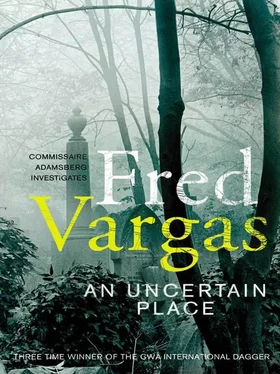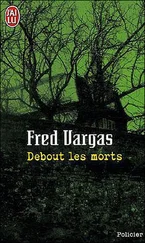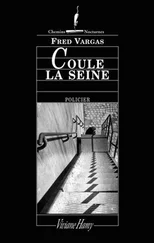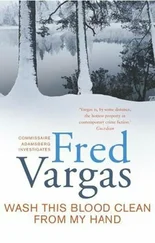‘Perfect. Write it on the tablecloth. How far do you go back?’
‘To about the 1760s, with about twenty-seven surnames.’
‘That should do.’
‘It’s not that difficult. All the ancestors married people from the next village. If they were really adventurous they moved about six kilometres away. I dare say they all went down to the bridge over the Jaussène to make love.’
‘That seems to be the tradition.’
Adamsberg tore the paper tablecloth when Veyrenc had finished his list, which had no trace of any name like Paole.
‘Listen carefully, Veyrenc. The killer of Pierre Vaudel-Plog and Conrad Plögener belongs to the line of descent from Arnold Paole, who died in 1727, in a place called Medwegya, not far from here. Zerk isn’t descended from any Paole. So there are just two possibilities for your nephew.’
‘Stop calling him my nephew. He’s your son as well.’
‘I don’t want to say “my son”. I prefer to say “your nephew”.’
‘Yes, I did gather that.’
‘Either your nephew did commit these crimes, because he was being manipulated by this Paole. Or it was Paole himself who was the killer, and planted the convenient little tissue belonging to your nephew. Either way, we need to find this descendant of Arnold Paole.’
Danica put two small glasses on the table.
‘Watch out,’ said Adamsberg, ‘it’s rakija .’
‘So?’
‘Try it. I tell you, if I’d had some of this stuff in the vault, I’d never have come close to dying.’
‘Ah, Froissy,’ said Veyrenc with an air of nostalgia, remembering the three little bottles of cognac. ‘But how are we going to find a descendant of Paole?’
‘We know one thing about him. It must have been a Paole who has some kind of hold over your nephew, and knows him well enough to imitate him. Think of someone in his circle of people, a substitute father figure, whom he sees often, whom he admires or fears.’
‘He’s twenty-nine. I don’t know everything about his life in Paris.’
‘What about his mother?’
‘She married this man four years ago. She lives in Poland now.’
‘You can’t think of anyone who might correspond?’
‘No. And it doesn’t explain why, if he didn’t do the murder, he would have boasted about it to you.’
‘Yes, it does,’ said Adamsberg. ‘By reversing their roles, Armel finds he has been transformed into Zerk, a sort of miraculous change. He’s no longer weak but strong, no longer good but bad. If there’s a Paole manipulating him, he counted on that. The son will crush the father. That’s what Zerk said to me. So Armel gets tipped off by Mordent, he obeys, he runs away, and he discovers what’s in the papers. Agreed?’
‘Yes.’
‘His face is all over the front page, suddenly he’s become a personality, a celebrity, an impressive monster. And who is he up against? Commissaire Adamsberg. At first he goes into shock. But he soon sees it as a golden opportunity. A new power and it’s fallen into his lap. A brilliant way to get his revenge on his father. What does he risk by acting the part of the monster for a day? Nothing. What does he get out of it? A lot. He can lay right into his father, show him his sins, make him feel guilt and responsibility. Does he even think about the handkerchief? No. His DNA at the murder scene? No, to him it’s just some mistake, they’ll find out soon enough. The proof is that he was tipped off, and told to lie low until things settle down. He hasn’t much time. This is a chance to be taken, a stroke of fate, and he’d better make the most of it. So he turns up at his father’s place dressed for the part. He talks like a killer, he turns into Zerk, he insults this bastard of an Adamsberg, he’s going to demolish him. Look, Adamsberg, your son’s a monster, your son’s got the upper hand now! And it’s all your fault, so now you’re going to suffer the way I’ve suffered. No good shouting and saying you’re sorry, it’s too late. Then once he’s put on his little show, he pushes off, leaving remorse and distress in Adamsberg’s head. His father’s out of action, he’s got his revenge. Your nephew’s not as sweet-tempered as all that.’
‘Not to you, no.’
‘Right. So he’s feeling quite pleased with himself. But no correction is published about the DNA found in Garches. He’s still a wanted murderer. The little drama goes into reverse. He needs his father now, but he’s confessed to the murder, claimed it. So now he’s scared stiff, is Armel, and he has to make a getaway. An outcome that any manipulative man with an ounce of sangfroid could have predicted. So who? It must be someone who’s known him a while, someone with a hold over him.’
‘The choirmaster,’ said Veyrenc, banging his glass down on the table. ‘Germain. He has a hold over him. I never liked him, nor did my sister, but Armel thinks the sun shines out of him.’
‘Tell me about it.’
‘Armel’s a tenor, he’s sung in a choir ever since he was twelve: Notre-Dame de la Croix-Faubin. I often used to take him to choir practice and listen. The choirmaster had his claws into him. That’s the kind of man he is.’
‘What do you mean?’
‘Well, by blowing hot and cold, alternating compliments and criticism, so Armel got to be like putty in his hands. Mind you, he wasn’t the only one, Germain had over a dozen of them round him like that. Then he was transferred to Paris and it stopped. No more choir. But when Armel went to Paris as well, it started up again. He sang a solo in a Rossini Mass and got a lot of praise. He loved it. At twenty-six, he was back under Germain’s thumb. But a year or two back, Germain was charged with sexual harassment and the choir was dissolved. And like a dope, Armel was broken-hearted.’
‘Did he go on seeing him?’
‘He swears not, but I suspect he’s lying. Maybe the guy asks him round, gets him to sing for him. It’s flattering, just like when he was a kid. Armel feels important to the father, whereas it’s the father who possesses him.’
‘What do you mean “father”?’
‘In the religious sense. Father Germain.’
‘What’s his real name?’
‘I don’t know, that’s what they called him.’
Danglard had left the office, gone home and taken off his elegant suit. Now he was slouching in his vest in front of the television’s blank screen, chewing cough drops one after another to keep his jaws occupied. In one hand he held his mobile, in the other his glasses, and checked about every five minutes to see if there was a message. Finally after several hours, 00 381 bleeped. He mopped his face with his handkerchief and deciphered the text message: ‘ Risen from tomb. Run check Fr Germain choirmaster N-D Croix-Faubin .’
What tomb for heaven’s sake? With sweating hands, Danglard tapped in his reply, his throat tight with rage, but his muscles relaxing with relief. ‘ Why no message B4? ’
‘ No sgnl wrong time so slept .’
True, thought Danglard guiltily. He had only come out of the basement when he had been dragged out by Retancourt.
‘ What tomb? ’ he texted.
‘ Vault 9 victims Plogojowitz. V cold. Feet recvrd .’
‘ Uncle’s cousin’s feet? ’
‘ Mine. Back tomorrow .’
ADAMSBERG WAS NOT A MAN WHO WENT IN FOR EMOTION: he skirted around strong feelings with caution, like swifts who only brush past windows with their wings, never going in, because they know it will be difficult to get out. He had often found dead birds in the village houses back home, imprudent visitors who had ventured inside and never again found their way back to the open air. Adamsberg considered that when it came to love, humans were no wiser than birds. And in most other respects birds were a lot more canny. Like those butterflies that had refused to go into the mill.
Читать дальше












